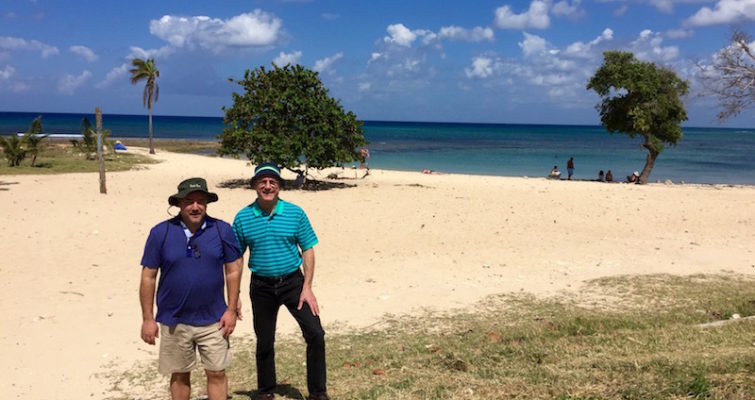
What today’s changes mean for Cuba travel
Big news today! As reported all over the place, and as documented in a new update on the Treasury Department’s Cuba Sanctions page, the Obama administration is relaxing some of the Cuba regulations.
The biggest change for my purposes involves People-to-People trips, the kind I lead. Here’s a breakdown of what’s changed legally, and what it means for all practical purposes.
The legal:
(Disclaimer: I’m not a lawyer and this isn’t legal advice thank you.)
For the last few years, the regulations required that all People-to-People trips be operated by an organization – not an individual. So in order to travel under this category, you couldn’t just choose your own adventure. Most travel under this category has been big bus tours operated by huge corporate outfits. As a small operator doing small, intimate groups, I’m an outlier.
Those big bus tours can only happen with involvement by Cuba’s official government tour agencies. They don’t permit big groups to tour independently, and you need their help to get the bus, the hotel rooms, et cetera. But having them involved in your trip means Cuba has total control over your itinerary. Among other things, they can push you to eat at government restaurants, stay at government hotels, and spend time/money on activities the government runs – so they get all the money. They can also show you the Cuba they want you to see and exclude everything else. (A Cuban once told me, “Don’t believe it’s like the picture they paint!“)

Here’s an example of Cuban home cooking at a Cuban home. No government restaurants for us! Classic meal elements are a meat, rice and beans, salad, and some kind of fried root vegetable. In this case, the meat is chicken, the beans are black, and the root vegetable is fried green plantains, aka tostones.
The change in the law is that people can now organize their own People-to-People trips – not through any organization, and not as part of a larger group. A quote I saw in the New York Times suggests the Obama administration wasn’t happy about Cuba’s control over the big groups (“the Potemkin tour of Cuba”), so this is a way to let people visit without official Cuban government oversight/control.
All the restrictions and requirements still apply. So anyone going as an individual is expected to understand the law and follow it, just as I’ve always had to do for my trips.
The practical:
First: I don’t see a way for travelers to be held accountable. A number of organizations have been playing fast and loose with it already, calling trips People-to-People without actually following the rules. Individuals have been blowing off the rules too – saying, “Oh, I’m going for journalism” or “I’m going for research” when they’re really going as tourists. So now individuals will say, “Oh, I’m on a People-to-People trip” when they’re really on vacation. I don’t expect there will be any accountability here, in part because I can’t imagine a feasible way to monitor or audit these travelers. And if anyone in the Obama administration wanted accountability, I think we’d see obvious signs of that. So I have to believe they don’t care.
(But maybe a Cruz administration would care… and would try to audit the hell out of all of us. I’m keeping my records in order, just in case!)

This was my taxi from Matanzas to Havana. It’s a collective taxi, so I paid for my seat and rode along with others. The 90-minute ride cost 5 or 6 bucks. If I’d looked like a confused tourist, there’s no telling what the rate would have been. She’s a beauty, no?
Second: People-to-People trips will now be cheaper and more accessible, which means more people will now try to go to Cuba. Every time the regulations are relaxed, more people get the bright idea that now’s the time they should go… fast, before it changes too much! And once airlines start running commercial flights, that’ll bring more people to Cuba, too. Of course, if you’ve been following my blog, you know that Cuba’s already way over capacity! Not an ideal time for even more people to start showing up.
So this will make it even worse. Everything I said in that blog post about Cuba being hard to deal with? It’s just going to get harder and harder. All the horror stories I’m hearing now – whether it’s travelers sleeping in parks because they can’t find a bed, or stranded somewhere because there isn’t enough transportation from one Cuban city to another, or getting charged crazy prices because the supply and demand are so out of whack – all that’s just going to get worse. Same with the kinds of problems I’m having myself, from booking lodging to transportation to restaurant reservations. (I expect restaurants to get especially bad when the big new cruise ships start showing up in May… and I’m already scheduling my trips so I’ll miss the big cruise days in all the port cities.)
Of course some folks will go and have no problems at all. But they’ll be the minority. If Cuba’s become this challenging for me, then for the average traveler showing up to Cuba for the first time, it won’t exactly be smooth sailing.
Ay, Cuba!
(Cultural note: Ay, Cuba! is how Cubans express frustration – or mixed frustration and affection – about what a pain in the ass Cuba can be.)




Write Your Comment